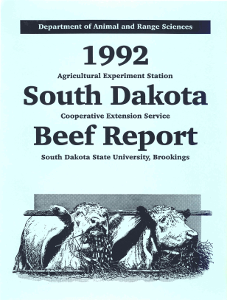Document Type
Report
Report Number
92-16
Publication Date
1992
Keywords
cattle, feedlot, climate
Summary
South Dakota's reputation for harsh winters is frequently cited as a limitation to our competitiveness in cattle feeding. To help quantify the impact of climate on cattle feeding, heifers produced in western South Dakota were fed in eastern South Dakota or in the Texas panhandle. Heifer calves were obtained from two ranches, assembled at SDSU, and sorted into three similar groups. Group 1 remained at the SDSU feedlot, Group 2 was shipped half-way to Texas and returned to SDSU, and Group 3 was sent on to Texas for feeding. These groups allow consideration of climate and transit stress on feedlot performance. Similar diets, health programs, and implants were used at each location. The 144 heifers were started on test November 8, 1991, and slaughtered on May 14 (SD) and May 15, 1992 (Tx). Cumulative average daily gain (3.01 Ib) was similar among locations. Interim gains differed among locations as weather conditions varied. Heifers consumed 4% more (P<.05) feed and were 4.5% less (P<.05) efficient when fed in South Dakota. Final weights and carcass weights were similar after 188 days on feed. Acute disease problems only occurred in Groups 2 and 3. The lower feed prices in South Dakota and lower costs for trucking and health made feeding more profitable in South Dakota.
Number of Pages
5
Format
application/pdf
Language
en
Publisher
South Dakota State University
Rights
Copyright © 1992 South Dakota State University.
Recommended Citation
Pritchard, R. H. and Preston, R. L., "Comparison of Production Efficiencies When Calves Are Fed in South Dakota or Texas" (1992). South Dakota Beef Report, 1992. 17.
https://openprairie.sdstate.edu/sd_beefreport_1992/17

